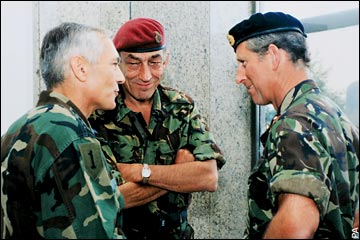Al-Sweady Inquiry: Mistreatment claims 'a tissue of lies', says former Army Chief
18/12/2014
General Sir Mike Jackson says allegations of human rights abuses by British soldiers in Iraq are without substance and have cast a 'terrible shadow' over the military.
General Sir Mike Jackson, the former head of the Army, has condemned the allegations at the centre of the Al Sweady inquiry as a "tissue of lies" which have cast a "terrible shadow" over the British military.
Speaking ahead of the publication of a controversial £30 million public inquiry into allegations troops killed, mutilated and mistreated Iraqi prisoners, Sir Mike said the claims "never had any real substance".
It is understood the inquiry will largely clear British soldiers of abuses.
"They were a tissue of lies, basically."
He added: "The British Army represents this nation, and this nation works under - thank heavens - the rule of law, and that applies to its soldiers as much as anybody else.
Sir Mike was chief of the general staff at the time of the Battle of Danny Boy, a fierce gun battle which took place in May 2004 and which is at the centre of the Al Sweady inquiry.
John Dickinson, a solicitor from Public Interest Lawyers, the firm representing the families of some of those involved, told Today: "I think there is evidence of mistreatment of those who were detained."
The five-year inquiry is expected to report that the most serious allegations were based only on lies and speculation, sources said.
Army leaders welcomed the expected findings and the conclusion is likely to increase pressure on the Government to protect troops deployed abroad from future human rights cases.
One former senior officer who commanded British troops during the 2003 invasion of Iraq claimed the use of human rights laws to sue British troops was "a racket" for lawyers.
Col Tim Collins, who commanded the 1st Battalion of the Royal Irish Regiment during the invasion, said: "We have to find ways to stop public money being plundered by human rights lawyers."
Lord Dannatt, a former head of the Army, said if the inquiry did clear soldiers it would be "hugely welcome".
He said: "This investigation has consumed a huge amount of time and energy."
The exhaustive inquiry, chaired by the Sir Thayne Forbes, a retired High Court judge, has heard from more than 300 witnesses investigating allegations that British troops killed and abused prisoners after the Battle of Danny Boy in southern Iraq.
The brutal clash saw fierce hand-to-hand fighting after Iraqi insurgents ambushed soldiers from the Argyll and Sutherland Highlanders near a checkpoint called Danny Boy, three miles north - east of Majar al - Kabir, in Maysan province.
As reinforcements were called in, soldiers fixed bayonets for the first time since the Falklands War and several were decorated for their bravery.
After the clash, soldiers took prisoners and dead bodies to discover whether an individual involved in the murder of six members of the Royal Military Police at their compound in Majar al-Kabir the year before was among them.
The inquiry was set up to investigate Iraqi accusations that Britain had killed and badly mistreated the captives at a nearby camp and detention centre.
Judges had earlier criticised the Ministry of Defence's response to the initial accusations and said the Human Rights Act required a proper investigation.
But lawyers for the Iraqis then dropped the most serious allegations earlier this year, saying the evidence showed "there is insufficient evidence to support a finding of unlawful killing".
The report is expected to restate that the worst allegations were largely without foundation. It is expected to make some criticisms about troops hooding captives, or giving them inadequate food and water during captivity.
The Tories have pledged to curb the activities of lawyers who specialise in claiming the British Armed forces breached human rights during conflicts overseas.
One Government source said the party was working on proposed legislation that would "limit the range of human rights cases to the UK exactly so that the British Armed forces serving overseas do not find themselves totally undermined in their ability to do their jobs."
Michael Fallon, the Defence Secretary, said last week he was angry it had taken the "£30 million of taxpayers' money to expose what appear to have been barefaced lies".

